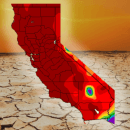The Arizona special election campaign of Hiral Tipirneni targeted ads at people across the country who “liked” the pages of liberal icons.
by Jeremy B. Merrill, ProPublica
Democrat Hiral Tipirneni, who lost this week’s special election to fill a vacant House seat in Arizona, couldn’t rely on the national party to fund her campaign. She received nothing from the Democratic Congressional Campaign Committee.
So she appealed to potential supporters far from Arizona, people who might not have even heard of her. About 40 percent of her campaign’s funds were raised from small donors. Such fundraising is an essential resource in districts previously hostile to Democrats for candidates like Tipirneni, who had sought to be the next example in a list of “blue-wave” victories.
According to ads submitted by users of our Facebook Political Ad Collector tool, one of her campaign’s strategies was to advertise to people who “like” more well-known liberal politicians and groups, even those in places far from the suburban Phoenix district she was running to represent.
You may have seen ads from Tipirneni if you’ve liked Sen. Elizabeth Warren, D-Mass., or Sen. Kirsten Gillibrand, D-N.Y. Tipirneni’s campaign, which didn’t respond to a request for comment Wednesday, may have been betting that if you’re inspired by one liberal woman, you’re more likely to want to donate to another.
Gillibrand’s campaign did support Tipirneni and sent emails to its supporters encouraging them to donate, according to Glen Caplin, a Gillibrand campaign spokesperson.
The data from the Political Ad Collector shows that Tipirneni’s ads also solicited donations from Facebook users who liked the pages for Planned Parenthood and Emily’s List, an organization that supports the campaigns of pro-choice Democratic women — and which endorsed Tipirneni.
We’ve been working with newsrooms around the country — and around the world — on tracking Facebook political ads. We’re looking for examples of misinformation, conflicting messaging, etc. — but we’re also hoping to understand how targeted ads and data modeling have affected the relationship between campaigns and voters. Here’s how you can help us gather data.
Despite losing to Republican Debbie Lesko, Tipirneni did far better than many Democrats have done previously in her heavily suburban area — the party didn’t even field a candidate in 2014 or 2016. For first-time or lesser-known candidates in traditionally Republican districts — like Tipirneni — raising enough money to run a credible campaign can be a steep hill to climb — especially for Democrats who receive minimal help from the national party. Lesko received plentiful support from the national Republican party.
For Democrats in special elections, advertising on Facebook is a necessity. Despite the backlash against the social network for its privacy policies and the much-disputed role Facebook played in the 2016 presidential race, it’s still a platform where Democrats who have won unlikely elections — like Alabama Sen. Doug Jones — reliably can find voters and, even more so, donors.
Jones used a similar technique, fundraising from people who liked the pages of comedian John Oliver and former Sen. Al Franken (before his resignation).
Another group the Tipirneni campaign’s ads asked to chip in $5? People who liked “The Rachel Maddow Show” page.
The idea of appealing to supporters of other candidates or groups is, of course, not remotely new. How it’s done, and who makes money, is what’s changed. Unlike renting an email list (still a common practice), advertising to people who like the page of a far-away politician or group doesn’t require getting permission or paying money to anybody — other than Facebook.


 (909) 335-8100 ·
(909) 335-8100 ·  (909) 335-6777
(909) 335-6777 Email:
Email: